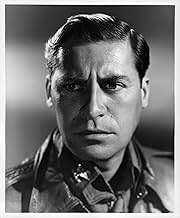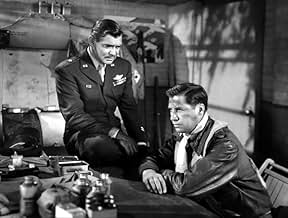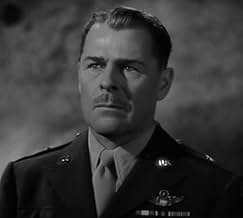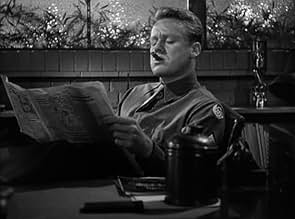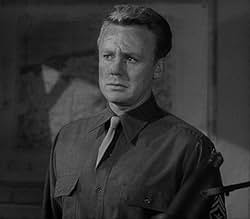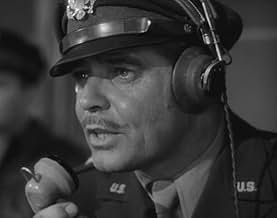Füge eine Handlung in deiner Sprache hinzuArmy generals struggle with the decision to prioritize bombing the German factories producing new jet fighters over the extremely high casualties the mission will cost.Army generals struggle with the decision to prioritize bombing the German factories producing new jet fighters over the extremely high casualties the mission will cost.Army generals struggle with the decision to prioritize bombing the German factories producing new jet fighters over the extremely high casualties the mission will cost.
- Regie
- Drehbuch
- Hauptbesetzung
- Auszeichnungen
- 3 Gewinne & 2 Nominierungen insgesamt
Empfohlene Bewertungen
Both during and after World War II there was a debate among the British and American air commanders over the value of daylight versus nighttime bombing attacks. The British did night raids over Germany, responding in kind to what the Luftwaffe had done to them. Fly over at high altitudes and just drop the bombs. It did make for fewer casualties among the RAF pilots of their Lancaster bombers.
The Americans opted for daylight raids at a lower altitude trying to hit certain strategic objectives. In Command Decision it involves three factories that intelligence has learned are manufacturing new jet aircraft. If the Nazis had ever developed the far advanced jets against the Allied propeller aircraft in any number, the course of the war over Europe might have changed. Just like the V-2 rockets were developed too late to help the Axis cause.
Command Decision has Clark Gable leading a distinguished cast as the general who has to make the decision about whether to bomb or not, to go into Germany's heartland without fighter escort. Unfortunately his purely military outlook is not shared by his immediate superior Walter Pidgeon who has to factor in the politicians in Congress who read the dispatches by correspondents like Charles Bickford here about the appalling losses in American life.
In many ways Pidgeon has the most difficult part in the film. He has to take in the voices of objection raised by the visiting Congressional delegation led by Edward Arnold. Pidgeon is a politician, but purely by necessity. We admire Gable's stand on principle, but the audience also respects Pidgeon and sympathizes with him.
On Broadway Command Decision takes place in the headquarters and to make it better for the screen, playwright William Wister Haines wrote an additional scene that Paul Kelly did not do on Broadway. Clark Gable on a radio microphone tries to talk down a bombardier who is piloting a plane where the pilot and co-pilot are wounded and killed. It's a harrowing scene and one of the best Clark Gable ever did. Gable must have drawn from his World War II experience, he was a tailgunner in our Army Air Corps and flew many a B-17 mission over Germany.
Rounding out a distinguished group of MGM contractees are Van Johnson, Brian Donlevy, Marshall Thompson, Cameron Mitchell, Warner Anderson, Ray Collins, John McIntire and John Hodiak. They all cast well as Army Air Force personnel. Johnson plays the part that James Whitmore originated on stage and provides what little humor there is in this film.
The main criticism of Command Decision has always been that it is too stagey. But I found it an absorbing account of the decision making process in a military command.
"Command Decision" tells a story of WWII air warfare from the point of view generals, politicians and the press, and the process of making a military decision in light of political consequences and public opinion. Clark Gable gives a great performance as General Casey, the officer who acts out of military necessity in choosing his targets, and in doing so, knows he puts the lives of his men and his friends on the line. Walter Pidgeon is General Kane, Gable's superior, who has lost some of his ability to look at his duty in purely military terms. Instead he perceives his mission is to fight the politicos and the press and to get the best spin on the actions of his command and commanders. Brian Donleavy is General Garnet, a relative newcomer to all of this. He is eager for his first command, but once on the scene at a combat headquarters, he begins to have doubts of his own about the mission, the politics and his own ability to send young men to their deaths.
The command decision in this fine, taut film is not one climatic decision, but is the story of a number of command decisions made by the three general officers, and how each effects and feeds off of the other men's command decisions throughout the film.
Good performances by all, a little melodramatic at times, but overall, one of the best war movies (especially about air warfare) you'll come across.
Adapted from a stage play, "Command Decision" suffers from a fair amount of "long-windedness". Fortunately the most long-winded character (Major General Kane-played by Walter Pigeon), is well written and has many substantial things to convey. Much like his character in "Forbidden Planet", Pigeon is tasked with inserting historical and philosophical details into the story, and his commanding screen presence makes him ideal for this purpose.
Brigadier General K.C. Dennis (Clark Gable) has the most screen time and most challenging role, as his character is the guy stuck between a rock and a hard place. He is accountable for making the hard decisions that send his men off to die, but has a fragile authority dependent on how much independence his superiors are allowing him at a particular point in time. Gable does fine in this part, probably his best totally "serious" performance. Although the film takes pains to use the German high command to illustrate examples of bad leadership, it is easy to infer that the same mindset applies to the Allies. With many military leaders distorting events to cover their own ass and willing to sacrifice men for their own career advancement and personal ideology.
The premise of the film is the Air Corps discovery that the Germans have developed the first jet combat plane. Based on the real life Messerschmitt Me-262 (shown as a model in the film and in some archival footage), it is called the "Lantze-Wolf" here and considered so effective as a fighter aircraft that full production would allow the Luftwaffe to regain air supremacy over Europe.
The planes are being assembled in three cities deep in Germany. The only hope to delay their full production is "Operation Stitch" (named for its goal of gaining a stitch in time), a plan to attack these sites through dangerous daylight bombing raids. Dangerous because they will be heavily defended and because the bombers will have to go the final hundred miles without fighter escort-since the America fighters do not have the range to reach and return from the target. This type of daylight bombing was called precision bombing because the bomb-site was more effective with better visibility and a lower altitude. The alternative was safer but less accurate saturation bombing at night (insert Dresden here).
General Dennis must decide whether to start the operation, and then when the bombers take substantial punishment he must decide whether to continue in the expectation of additional high losses.
The film takes certain historical liberties as only after a postwar evaluation of the actual ME-262 did anyone really understand its strategic potential (in the hands of well trained pilots) as a fighter aircraft. Until the end Hitler insisted that it be utilized almost exclusively as a bomber. Although able to carry out this alternative role, its bomb load capacity was too little for any significant impact. That the ME-262 is more a footnote to the war than a major element was due more to Hitler's decision than to any allied efforts to limit its production.
Then again, what do I know? I'm only a child.
Writing as one who lived through the bombing of Britain, the historical perspective on the Allied wartime bombing campaign was fascinating. One small complaint--all film coverage of the American campaign in WW2 seems to focus on the Flying Fortress. Actually, most of the bombs were dropped by the Consolidated Liberator squadrons--less photogenic but more effective!
Wusstest du schon
- WissenswertesClark Gable enlisted in the US Army Air Forces after his wife Carole Lombard died in a plane crash on a war bonds selling trip assisting the war effort. Gable went to Officers Candidate School (OCS), graduating as a second lieutenant, and was eventually promoted to major. He was trained as an aerial gunner and combat cameraman and was awarded both the Distinguished Flying Cross and Air Medal for at least five aerial bombing missions over Germany from England with the 351st Bomb Group (Heavy). Adolf Hitler personally offered a reward to the pilot or anti-aircraft gun crew who shot down Gable's plane.
- PatzerWhen General Dennis tries to talk down the bombardier flying the crippled bomber, the bombardier reports that the aircraft's fuel is exhausted. Presumably he had also dropped his bomb load over the target. His on-board supply of machine gun ammunition should be very low if not exhausted. Yet when the bomber crashes, it explodes and burns. If he has no bombs, no gas , and no machine gun ammunition, what's to burn?
- Zitate
James Carwood: What's the answer, Brockie, all guts and no brain?
Elmer Brockhurst: No. That's putting it too simply. Dennis is one of those boys whose brain is fascinated by guts. He loves this lousy war.
- Alternative VersionenAlso available in a computer colorized version.
- VerbindungenFeatured in Clark Gable: Tall, Dark and Handsome (1996)
Top-Auswahl
- How long is Command Decision?Powered by Alexa
Details
Box Office
- Budget
- 2.467.000 $ (geschätzt)
- Laufzeit
- 1 Std. 52 Min.(112 min)
- Farbe
- Seitenverhältnis
- 1.37 : 1


